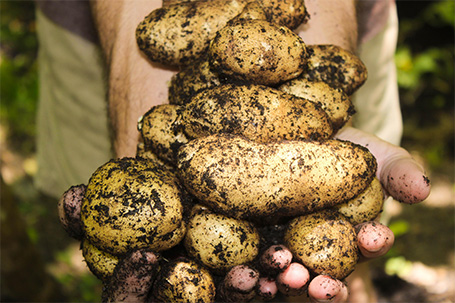Today, in modern agricultural production, favorable soil fertility is needed as the main factor influencing yield.
Successful and profitable agricultural production is inconceivable without the use of modern agricultural techniques, knowledge and information about the soil.
The importance of soil analysis in crop production is growing due to rising prices of mineral fertilizers and power sources.


Yield amount and its quality is in the soil-plant system correlation.
Soil fertility cannot be determined once and used as a longterm guideline as soil fertility is not an absolute value. This value must be constantly measured and according to the data obtained, a fertilization recommendations are given.
In practice, it is most often improvised and subjectively visually (deductively) assessed, which results in reduced yields and crop quality and ultimately lower earnings.
Nitrogen (N), Phosphorus (P) and Potassium (K) are the basic elements needed by plants.
For this reason, they are called macro nutrients and are the main meal in plant nutrition.
Nitrogen
Nitrogen is indispensable in plant life and is a major factor in plant fertilization. Nitrogen is found in proteins, vitamins, hormones, chlorophyll.
Nitrogen is responsible for the growth and development of plants, for the growth of shoots, for the development of green plant mass. Nitrogen is absorbed from plants through the mineralization of organic matter and is absorbed from applied mineral fertilizers. Also some plants, with the help of bacteria, fix nitrogen from the air to the soil. Of course, if we have an excess of nitrogen in the nutrition of plants, the balance of nutrition is disturbed and the plants become more exposed to the attack of the disease.
Phosphorus
Phosphorus is a biogenic element that makes up the composition of DNA and RNA and is a regulator of energy exchange ATP and ADP which is stored in seeds and buds. Phosphorus contributes to the formation of buds, roots, and lignification.
Phosphorus deficiencies are most often seen as suffocation of plants, slow growth and development, reduced production, smaller fruit size.
Phosphorus in the soil is usually not available to plants and is absorbed from the soil solution very slowly. Certainly, our goal is to compensate for the lack of phosphorus in plant nutrition by adjusting the plant diet with an adequate amount and rational fertilization.
Potassium
Potassium is not a biogenic element, but it plays an important role in many physiological functions of plants. Potassium regulates plant turgor and the storage of carbohydrates within plants. Potassium is an important factor for fruit size, for better fruit taste, and has a positive effect on the color and smell of flowers.
We have relatively enough potassium in the soil, but it is lost from the soil by leaching and erosion, and especially in sandy soils it is not enough for the growth and development of plants.
There are different ways, methods and procedures in analyzing nutrients, and today everyone’s priority is to get accurate and verified results in the shortest possible time, because waiting from one to two weeks certainly means a risk for the money invested.
Hanna Instruments offers a photometer for the analysis of nutrients in the soil, with which customers can obtain the required data in one day, targeting a number of different measurements with high accuracy and speed.
By pairing Hanna Instruments lysimeters with a photometer for soil nutrient analysis we have a precise and accurate tool in soil nutrient analysis.
The Hanna’s iris spectrophotometer offers an even wider range of soil, water and nutrient solutions. In conjunction with Hanna Instruments lysimeters we can continuously perform analyzes on annual or permanent crops and have complete control of plant nutrition in real time at each physiological stage of plants. With this you can feed them precisely and balanced according to their current needs.
The reason why the combination of lysimeter + photometer / lysimeter + spectrophotometer from Hanna Instruments is recommended is that the soil solution is the main carrier of nutritious phytomatter materials, acidification but also all the nutrients that remained available to the plants.
HI83900-30
for Root Level Soil Monitoring
The HI83900 Suction Lysimeter is used to extract soil solutions for chemical analysis of nutrients important to plant growth. This sample collection tool is built with a porous ceramic cap that is connected to a 30, 60, or 90 cm transparent tube. A rubber capillary extends from the plastic syringe through the tube, reaching the ceramic tip. The HI83900 allows operators to easily monitor the level of fertilizer nutrients such as ammonia, nitrate, phosphorus, potassium, sulfate, calcium, and magnesium.
- Sintered ceramic cap
- Three tube lengths available
- Sample collection at root level
HI83325-02
Nutrient Analysis Photometer
HI83325 is a compact, multiparameter photometer for use in the environmental lab or in the field. The meter is one of the most advanced photometers available with a innovative optical design that utilizes a reference detector and focusing lens to eliminate errors from changes in the light source and from imperfections in the glass cuvette. This meter has 9 different programmed methods measuring 8 key plant nutrient water quality parameters and also offers an absorbance measurement mode for performance verification and for users that would like to develop their own concentration versus absorbance curves. Plant nutrient-specific parameters include potassium, calcium, and magnesium. To save valuable laboratory benchtop space, the HI83325 doubles as a professional pH meter with its digital pH/temperature electrode input. Now one meter can be used for both photometric and pH measurements.
HI801-02
Spectrophotometer iris
The HI801 Iris is a sleek and intuitive spectrophotometer that allows for measurement of all wavelengths of visible light.
Customize your methods, take a wide range of measurements, and feel confident in your testing accuracy with iris.
- Iris features precise wavelength selection between 340 nm to 900 nm for complete method compliance and accuracy that is necessary in industries like professional laboratories, water treatment facilities, wineries, and more.
- Results are consistent and accurate regardless of throughput with the high quality and uniquely designed optics system.
- Customization options include multiple cuvette shapes and sizes, custom calibration curves, and methods.
Parameters that can be measured with spectrophotometrical methods:
- Ammonia
- Calcium
- Iron
- Magnesium
- Nitrate
- Phosphate
- Potassium
- Sulfate
Despite mentioned parameters, that are so important in soil and water analysis, there are more than 90 other parameters that can be measured on our spectrophotometer iris.
All measurements performed using HANNA Instruments photometers and spectrophotometers are performed from an aqueous solution of soil and reagents that are adapted to each targeted parameter.
Vegetable growers, florists, fruit growers, viticulturists and farmers have the benefit of being able to fertilize certain segments of their plots and areas adequately according to culture and variety, thus saving on fertilizers and maximise profit, expected yield and quality.
Hanna Instruments is a companion to farmers in the “green factory” outdoors and in a protected area.
Author:
Saša Perica, bacc.ing.agr.






